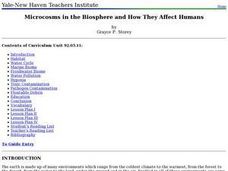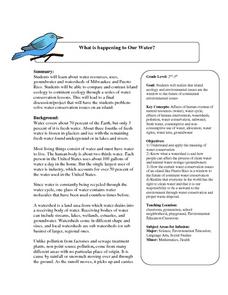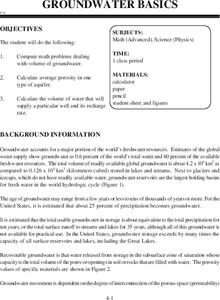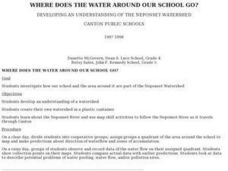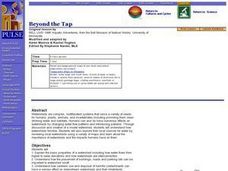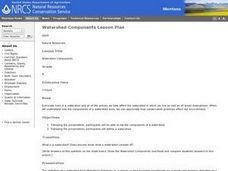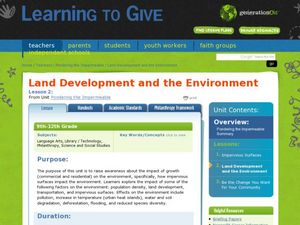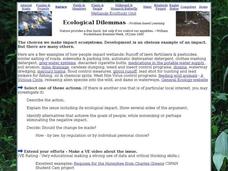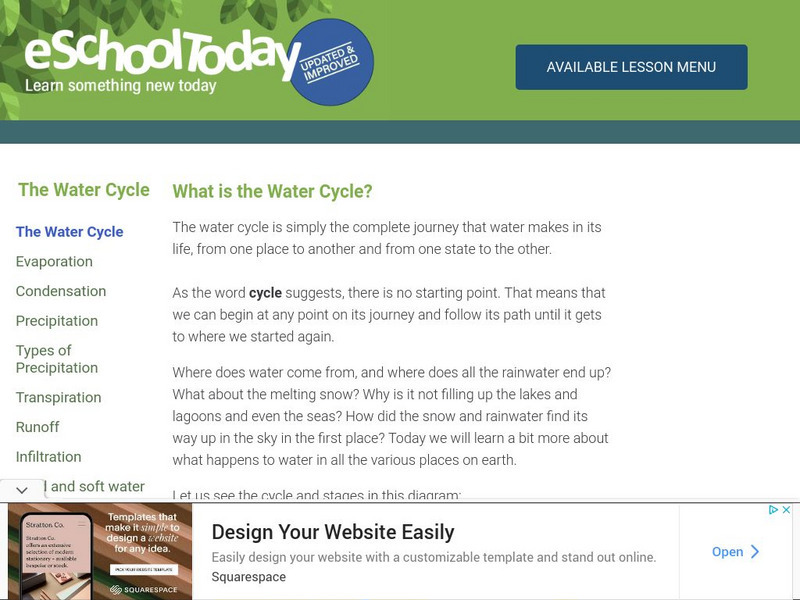Curated OER
Science: Microcosms in the Biosphere
In a series of lessons, examine the impact on humans by microcosms in the biosphere. Among the plans structured for students with different abilities and learning styles, are activities describing the symbiotic relationship, drawing the...
Curated OER
What is Happening to Our Water?
Learners compare and contrast Wisconsin's water resources to that of Puerto Rico. They research books about islands, particularly the Puerto Rican islands. Student view illustrations of island ecology. They discuss the illustrations and...
Curated OER
What are the Chemical and Microbiological Effects of Run-off from a Catfish Pond on the Surrounding Soil and Water?
Students study data from a USDA catfish pond. They look for microbial populations and chemical concentrations in the runoff to determine the effectiveness of filter strips. They use their knowledge of biogeochemical cycles to explain the...
Illinois Department of Natural Resources
Section Two: Why is Biodiversity Important?
Explore soil, genetic traits, natural resources, and pollution in a series of lessons that focus on biodiversity. Kids complete experiments to learn more about the importance of varied genes and organisms in an ecosystem.
Curated OER
Groundwater Basics
Groundwater is an essential natural resource, not to mention a fascinating topic to study. Here is a series of twelve amazing lessons on the water source and how we use it in our daily lives. Concepts require higher math and physics...
Curated OER
Where Does the Water Around Our School Go?
Students in groups, map quadrants of the area around the school and make predictions about the direction of waterflow and zones of accumulation that will occur when it rains. Then when it does rain they check to see if their prediction...
Curated OER
Intro to Civil Engineering and Hydrology
Students identify the processes involved in the water cycle. In this math lesson, students explain what civil engineers and hydrologist do. They watch a video about flooding in Texas.
Curated OER
Rainy Day Hike
Students develop awareness about the water cycles. They identify the watershed in which their school is located. They explain the role the schoolyard plays in the watershed.
Curated OER
Beyond the Tap
Students explain the basic properties of a watershed including how water flows from higher to lower elevations and how watersheds are interconnected. They comprehend how the placement of buildings, roads, and parking lots can be...
Curated OER
Watershed Components
Eighth graders examine the components of a watershed. They view overheads, discuss the hydrologic cycle, and observe a demonstration of a soil erosion box.
Curated OER
Water Quality and Temperature
Students are led through three activities to explore the effect of temperature fluctuations on the growth and survival of aquatic plants, clams, and shrimp eggs.
Curated OER
Hydrology: Flood Mitigation
Twelfth graders discuss the different factors that can contribute to major floods. In this ecology activity, 12th graders analyze collected rainfall data. They complete a scavenger hunt after the activity.
Curated OER
Hydrology: Flood Mitigation
Twelfth graders discuss the factors that affect flooding. In this environmental science instructional activity, 12th graders analyze rainfall data about flooding. They complete a scavenger hunt worksheet using the internet.
Curated OER
Land Use and Nitrogen
Students consider the effects of development on water quality. They test nitrogen levels in waters before and after development, investigate wastewater treatment options and research best management practices to reduce nitrogen loads.
Curated OER
Exploring Our Watershed System
Students examine how watershed systems are made up, and visit the Susquehanna watershed system and map out the system. They evaluate the order of watercourses in their area.
Curated OER
Land Development and the Environment
Learners examine the relationship between land development and the environment. In this environmental stewardship lesson, students explore how population density, land development, transportation, and impervious surfaces take their toll...
University of Wisconsin
Rain Garden Species Selection
The activity really comes to life within its intended unit on starting a rain garden. Working in groups, participants research native plants and coordinate them with the conditions in the designated garden area. Give the class access to...
University of Wisconsin
A Rain Garden Year
Pupils become plants in an interpretive play that depicts what happens throughout the seasons in a rain garden. As you narrate, students bloom, flower, and go to seed accordingly. The lesson is first in a series of lessons written for...
Curated OER
Ecological Dilemmas in Wetlands
In this ecological dilemmas in wetlands worksheet, students select a topic, use the links to websites for research, describe the topic, explain its impact on wetlands, identify alternatives and decide on possible...
US Geological Survey
U.s. Geological Survey: What Is the Water Cycle?
A quick summary of the water cycle that includes a diagram of the cycle, with links to in-depth explanations of each component of the cycle. Click "water-cycle home" to access water-cycle resources in a variety of languages.
TeachEngineering
Teach Engineering: The Other Water Cycle
For young scholars that have already been introduced to the water cycle, this lesson is intended as a logical follow-up. Students will learn about human impacts on the water cycle that create a pathway for pollutants beginning with urban...
TeachEngineering
Teach Engineering: Natural and Urban "Stormwater" Water Cycle Models
Students apply their understanding of the natural water cycle and the urban stormwater water cycle, as well as the processes involved in both cycles to hypothesize how the flow of water is affected by altering precipitation.
TeachEngineering
Teach Engineering: Natural and Urban Stormwater Water Cycles
Through an overview of the components of the hydrologic cycle and the important roles they play in the design of engineered systems, students' awareness of the world's limited fresh water resources is heightened. The lesson lays the...
eSchool Today
E School Today: Your Revision Notes on the Water Cycle
Learn about the different stages of the Earth's water cycle, and about processes involving water, including runoff, infiltration, and the differences between hard and soft water.


